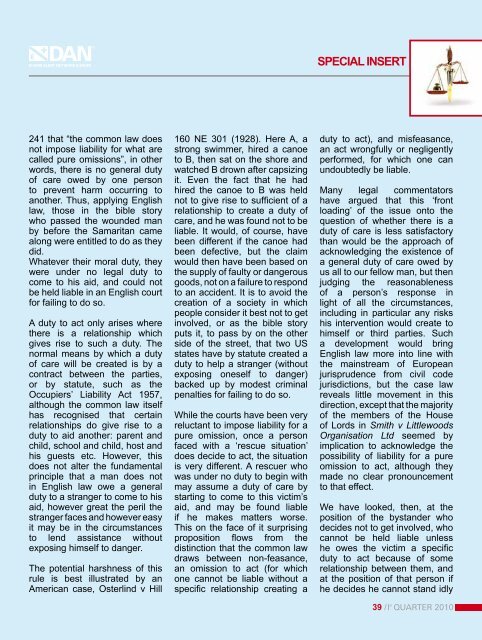Alert Diver - DAN Europe
Alert Diver - DAN Europe
Alert Diver - DAN Europe
Create successful ePaper yourself
Turn your PDF publications into a flip-book with our unique Google optimized e-Paper software.
241 that “the common law does<br />
not impose liability for what are<br />
called pure omissions”, in other<br />
words, there is no general duty<br />
of care owed by one person<br />
to prevent harm occurring to<br />
another. Thus, applying English<br />
law, those in the bible story<br />
who passed the wounded man<br />
by before the Samaritan came<br />
along were entitled to do as they<br />
did.<br />
Whatever their moral duty, they<br />
were under no legal duty to<br />
come to his aid, and could not<br />
be held liable in an English court<br />
for failing to do so.<br />
A duty to act only arises where<br />
there is a relationship which<br />
gives rise to such a duty. The<br />
normal means by which a duty<br />
of care will be created is by a<br />
contract between the parties,<br />
or by statute, such as the<br />
Occupiers’ Liability Act 1957,<br />
although the common law itself<br />
has recognised that certain<br />
relationships do give rise to a<br />
duty to aid another: parent and<br />
child, school and child, host and<br />
his guests etc. However, this<br />
does not alter the fundamental<br />
principle that a man does not<br />
in English law owe a general<br />
duty to a stranger to come to his<br />
aid, however great the peril the<br />
stranger faces and however easy<br />
it may be in the circumstances<br />
to lend assistance without<br />
exposing himself to danger.<br />
The potential harshness of this<br />
rule is best illustrated by an<br />
American case, Osterlind v Hill<br />
160 NE 301 (1928). Here A, a<br />
strong swimmer, hired a canoe<br />
to B, then sat on the shore and<br />
watched B drown after capsizing<br />
it. Even the fact that he had<br />
hired the canoe to B was held<br />
not to give rise to sufficient of a<br />
relationship to create a duty of<br />
care, and he was found not to be<br />
liable. It would, of course, have<br />
been different if the canoe had<br />
been defective, but the claim<br />
would then have been based on<br />
the supply of faulty or dangerous<br />
goods, not on a failure to respond<br />
to an accident. It is to avoid the<br />
creation of a society in which<br />
people consider it best not to get<br />
involved, or as the bible story<br />
puts it, to pass by on the other<br />
side of the street, that two US<br />
states have by statute created a<br />
duty to help a stranger (without<br />
exposing oneself to danger)<br />
backed up by modest criminal<br />
penalties for failing to do so.<br />
While the courts have been very<br />
reluctant to impose liability for a<br />
pure omission, once a person<br />
faced with a ‘rescue situation’<br />
does decide to act, the situation<br />
is very different. A rescuer who<br />
was under no duty to begin with<br />
may assume a duty of care by<br />
starting to come to this victim’s<br />
aid, and may be found liable<br />
if he makes matters worse.<br />
This on the face of it surprising<br />
proposition flows from the<br />
distinction that the common law<br />
draws between non-feasance,<br />
an omission to act (for which<br />
one cannot be liable without a<br />
specific relationship creating a<br />
SPECIAL INSERT<br />
duty to act), and misfeasance,<br />
an act wrongfully or negligently<br />
performed, for which one can<br />
undoubtedly be liable.<br />
Many legal commentators<br />
have argued that this ‘front<br />
loading’ of the issue onto the<br />
question of whether there is a<br />
duty of care is less satisfactory<br />
than would be the approach of<br />
acknowledging the existence of<br />
a general duty of care owed by<br />
us all to our fellow man, but then<br />
judging the reasonableness<br />
of a person’s response in<br />
light of all the circumstances,<br />
including in particular any risks<br />
his intervention would create to<br />
himself or third parties. Such<br />
a development would bring<br />
English law more into line with<br />
the mainstream of <strong>Europe</strong>an<br />
jurisprudence from civil code<br />
jurisdictions, but the case law<br />
reveals little movement in this<br />
direction, except that the majority<br />
of the members of the House<br />
of Lords in Smith v Littlewoods<br />
Organisation Ltd seemed by<br />
implication to acknowledge the<br />
possibility of liability for a pure<br />
omission to act, although they<br />
made no clear pronouncement<br />
to that effect.<br />
We have looked, then, at the<br />
position of the bystander who<br />
decides not to get involved, who<br />
cannot be held liable unless<br />
he owes the victim a specific<br />
duty to act because of some<br />
relationship between them, and<br />
at the position of that person if<br />
he decides he cannot stand idly<br />
39 /<br />
3 / I FIRST 2010














